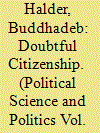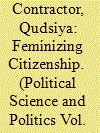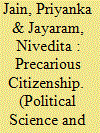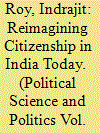|
|
|
Sort Order |
|
|
|
Items / Page
|
|
|
|
|
|
|
| Srl | Item |
| 1 |
ID:
181071


|
|
|
|
|
| Summary/Abstract |
Within days of passing the 2019 Citizenship Amendment Act (CAA), the Indian government allocated 39.4bn rupees (£427m) for updating the National Population Register (NPR) database (BBC 2019). Updating the NPR database is regarded as the first step toward a nationwide National Register of Citizens (NRC), which will enumerate all Indian citizens. The government’s determination to conduct a countrywide NPR exercise as part of the 2021 Census provoked doubts about its real intention because, with the passage of the CAA, religion has become a criterion for expediting the acquisition of Indian citizenship. Indeed, India’s Home Minister, Amit Shah, outlined the chronology (Dowerah Reference Dowerah2019) linking the NPR, NRC, and CAA with characteristic (BJP 2019) clarity: “Please understand the chronology. First, we will bring the CAA.
|
|
|
|
|
|
|
|
|
|
|
|
|
|
|
|
| 2 |
ID:
181072


|
|
|
|
|
| Summary/Abstract |
Almost from the moment of its promulgation, the amendments to India’s citizenship laws have generated protests across the country. The images of a young Muslim woman student from Jamia Milia Islamia who stopped a policeman from assaulting a male student and the crowds of women gathered at a Delhi neighborhood called Shaheen Bagh are now etched in public memory. The image of resistance to the newly introduced Citizenship Amendment Act (CAA) has become that of a Muslim woman holding the national flag and a portrait of Bhimrao Ramji Ambedkar, the architect of the Indian Constitution. Younger Muslim women have been active in expanding support to the peaceful protests through social media and a door-to-door campaign to create awareness of the need to resist the CAA. Many of these women are first-time participants in a public protest that has spread nationwide, as Muslim men continue to support them from the side lines.
|
|
|
|
|
|
|
|
|
|
|
|
|
|
|
|
| 3 |
ID:
181070


|
|
|
|
|
| Summary/Abstract |
In January 2020, residents of a slum in the suburbs of Bengaluru city (Karnataka State) found their homes razed to the ground by the city’s municipality. At the receiving end were internal labor migrants,Footnote 1 who routinely face such harassment in the cities to which they move for work. Although such evictions are a mainstay of contemporary urban life in India, this particular demolition caused an unusual stir because it reeked of the ominous politics of India’s new citizenship laws. The event was triggered by a viral video shared by a local resident that portrayed the slum as an unhygienic and “illegal Bangladeshi settlement.”
|
|
|
|
|
|
|
|
|
|
|
|
|
|
|
|
| 4 |
ID:
181066


|
|
|
|
|
| Summary/Abstract |
In December 2019, the Indian Parliament amended India’s citizenship laws. Under the provisions of the Citizenship Amendment Act (CAA), Hindus, Buddhists, Jains, Christians, Sikhs, and Zoroastrians from its Muslim-majority neighbors Afghanistan, Pakistan, and Bangladesh will have their applications for citizenship fast-tracked. By explicitly omitting Muslims, Jews, Bahais, and atheists from its purview, the CAA introduced a religious filter that attacks the secular principles enshrined in the constitution. People from the six listed religious communities who entered India before December 31, 2014, were now eligible to apply for citizenship, with residence requirements reduced from 12 years to six.
|
|
|
|
|
|
|
|
|
|
|
|
|
|
|
|
|
|
|
|
|